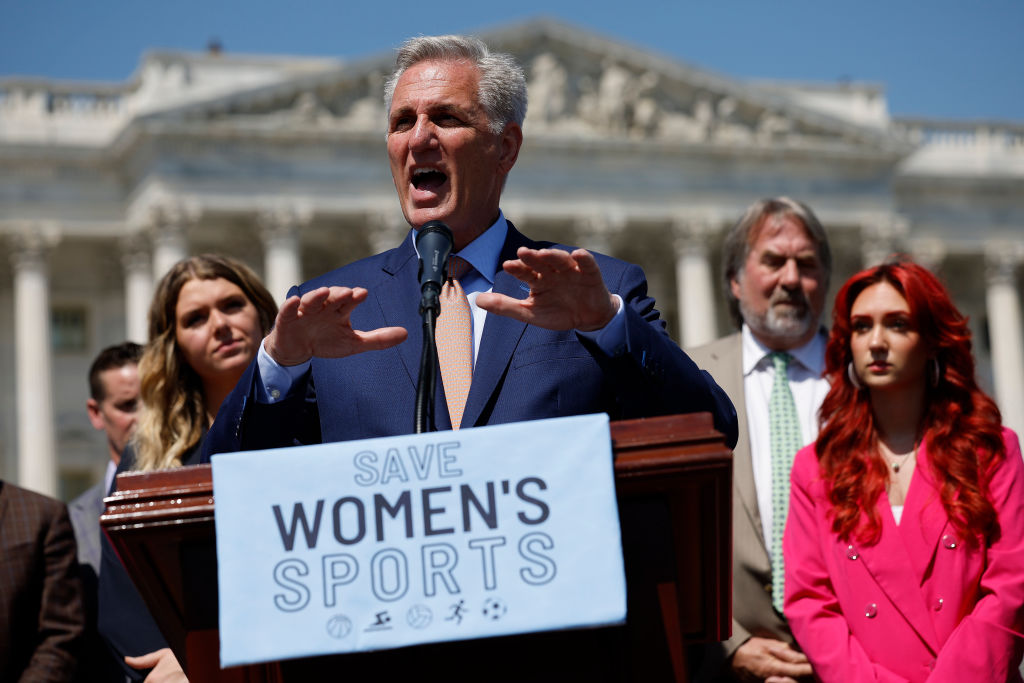Republican Bill Targets Trans-Inclusivity in School Sports
In the U.S., recent legislative developments at the federal level over the last few months may jeopardize constitutional protections against sex- or gender-based discrimination. Most recently, for example, a bill just passed in the House of Representatives aims to modify Title IX. As the country’s eminent civil rights law, Title IX currently prohibits discrimination in schools that receive federal funding. Members of the political Right, however, are attempting to revise the civil rights law in order to exclude transgender people from the gender-based protections that this law provides.
Title IX’s Midlife Crisis
Last year, many celebrated the 50th anniversary of formal, federal civil rights legislation for students. The Education Amendments of 1972, colloquially known as “Title IX,” have protected students’ equality and freedom from discrimination for half a century.
The Biden administration has explicitly stated Title IX protects transgender students, and has also vowed to investigate complaints involving such students. At the same time, Biden’s team has announced its intention to rewrite Trump-era laws in a way that would integrate new protections for students of this demographic into the current laws. Among these promised additional protections are the right to access school bathrooms that match a person’s gender identity and the right to participate in school sports that align with a person’s gender identity. However, the Biden Admin’s policy directives do not yet have the force of law. You can read more about these developments at Findlaw’s Learn About the Law.
Unsurprisingly, steps by progressives to broaden Title IX’s protections have been met with much resistance over the years, largely by Republicans. It’s not news that the political Right have for quite some time been targeting transgender rights. As of late, many Conservatives have been focusing largely on the issue of trans participation in gendered sports—a “GOP litmus test,” as the publication The Hill called it. Now, this new bill passed by the House is just another nail in the coffin of trans rights.
Republicans’ Proposed Amendment
On February 1, Republicans in the House, led by William G. Steube of Florida, proposed a bill that originated within the House Education and Workforce Committee. Called the “Protection of Women and Girls in Sports Act of 2023,” the title of the bill would suggest that it reinforces constitutional protections already provided by Title IX. However, it is actually intended to ban transgender women’s and girls’ participation in cisgender women’s and girls’ school sports. The Republicans’ general goal in proposing the law was to keep school athletic programs from allowing individuals whose biological sex at birth was male from participating in programs that are “for women or girls.” On Thursday, April 20, the bill narrowly passed the House, with a vote of 219-203. Among the co-sponsors were House Minority Leader Kevin McCarthy (R-CA) and Representative George Santos (R-NY).
The bill is interesting in its conciseness; the effective part of the text hovers around a mere 150 words. After all, it is just an amendment to an existing law. It is not an entirely new statute. But if you’ve studied constitutional law and the Bill of Rights, you’ll know just how much power and controversy can be contained in an amendment that seems short and sweet on its face. The recently-proposed law is also a “bill of rights,” but one of a very different nature. This new bill seeks to accomplish its goal by making it illegal for Title IX institutions “to permit a person whose sex is male to participate in” women’s athletic programs and activities, and further defines “sex” as “based solely on a person’s reproductive biology and genetics at birth.”
Republicans Leverage Their Win
The bill’s Republican co-sponsors seem to have been strategically leveraging the issue at its core for their own political gain. Its passing the House was seen as a major win for Speaker Kevin McCarthy, “who hopes to keep his narrow Republican majority unified, as a fight over raising the nation’s debt ceiling looms,” Reuters has said. And just last month, George Santos filed paperwork that would allow him to run for reelection, despite allegations that he has broken campaign finance laws.
In a news conference at the Capitol, McCarthy addressed reporters, backed by three cis female athletes who had lost competitions to trans athletes. “There’s a reason why there’s men and women’s sports,” he said. “It’s about fairness. And if there’s one final fiber of America, it’s about giving people an opportunity.”
The bill’s leader, Representative Steube, and other Republicans seem to be commemorating Title IX’s 50th birthday by “calling for expanded protections of women’s sports against transgender athletes.” McCarthy painted the situation as seeking to double back on the rights that the original statute created but were now, according to him, being threatened. “Fifty years after we made Title IX the law of the land, women’s sports are facing an existential threat,” he said. “There are so many things that are unfair about this new system. It erases women’s sports. It attacks American values like fair competition . . . and it creates a world where female athletes who speak out are actually bullied by their peers.” The Bill has also been supported by the Republican Study Committee.
The Broader Battle for Trans-Inclusivity
This premature victory for Republicans is just the latest development that would jeopardize trans-inclusivity. The political battle on LGBT issues—disguised as a legal battle—has been going on for some time.
Earlier this month, Florida Republican Governor Ron DeSantis’ [in]famous law, the Parental Rights in Education Act, gained even more traction. Deemed the “Don’t Say Gay” bill by its critics, it has caused much controversy since being passed into law last year. On April 19, the state’s education board voted to expand the ban to all grades in public schools. DeSantis, yet another Republican that opposes trans-inclusive laws, plans to run for president in 2024.
Since the “Don’t Say Gay” bill was signed into law, it has made many an enemy—most famously among them, Walt Disney Co. The text of the law also serves as a threat to even progressive, LGBT-friendly teachers; critics of the bill say that its language is “so vague that teachers would likely avoid the subjects altogether rather than risk their careers.”
Though the bill has also periodically faced legal challenges, federal judges have consistently dismissed lawsuits that would interfere with it. Meanwhile, appellate judges of the Second Circuit have allowed a lawsuit brought by cis-gendered women athletes to proceed against the Connecticut Interscholastic Athletic Conference (CIAC). The women athletes initiated the lawsuit over Connecticut’s trans-inclusive policies in school sports within the state. The plaintiffs claimed that the state’s permitting transgender women athletes to compete against them created unfair disadvantages for cis-gendered women in school sports.
A Political Pawn That Probably Won’t Pass
Despite what the bill may represent for liberals—a cudgel to civil rights—those in favor of the new law tout it as preserving civil rights in its own way. Essentially, proponents and opponents of the Act are each, purportedly, aiming to protect the rights of a historically disadvantaged minority. The difference is the minority at stake: cisgender women versus transgender persons. Both critics and supporters of trans-inclusive policies argue that civil rights laws based on sex discrimination serve their own respective interests, however diametrically opposed each party’s objectives seem.
For now, the new bill is unlikely to pass in the Democrat-controlled Senate. President Biden has called the proposed law “discriminatory.” He has said that he would veto it if that becomes necessary. As we approach the 2024 election, we can only expect the issue of trans-inclusion to loom larger and be further leveraged, at least by Republicans aiming to secure their incumbent seats.
You Don’t Have To Solve This on Your Own – Get a Lawyer’s Help
Meeting with a lawyer can help you understand your options and how to best protect your rights. Visit our attorney directory to find a lawyer near you who can help.






